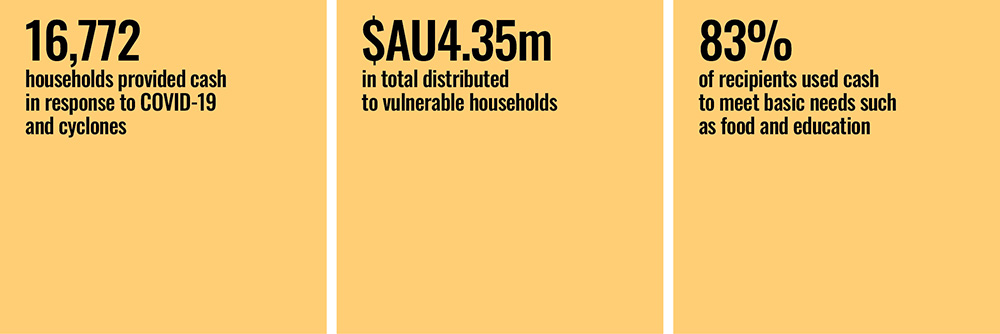The focus for gender at SCA this year was to increase resources dedicated to addressing gender inequalities in all new program designs. 100% of our new projects meet the minimum standard of ‘gender sensitive’ when tested against the gender equality marker. Most new projects have been classified as ‘gender transformative’, the highest level for measuring gender equality integration.
 Return to top
Return to top
Evaluating our programs
Learning and Evaluation from the Fiji Cash Assistance Project
As part of Save the Children’s commitment to deliver evidence-based interventions to benefit children, we systematically assess the effectiveness of our programs and their impacts at local, national, regional and global levels.
In 2021 we evaluated the first Phase of the Fiji Cash Assistance Project. The principal outcome was the provision of cash to 16,772 households, via mobile phones, in response to COVID-19 and cyclones. The total distributed to vulnerable households was equivalent to approximately $AU4.35m.

Further assessment revealed that the Fiji Cash Assistance Project reached approximately 20% of Fiji’s population at a time when it was most needed. Results of monitoring showed that 85% of recipients used cash to meet basic needs. This included purchasing food and paying for children’s education. Qualitative data showed that cash transfers empowered households to make their own choices according to their own needs: some paid for joint activities such as a community water pipe; others used cash to invest in education or enterprise to shore up their future; and many more used cash to fulfil their own unique priorities. For example, a single father built a toilet for his children and a transgender recipient bought make-up with which they felt comfortable to leave the house.
As the next phase of the project was prepared, an independent review was commissioned to understand the impact and generate data to improve the program. These lessons were integrated into the second phase of the project. A one-minute video version of the impact narrative was also created to support advocacy efforts among existing and future partners. The review report is available on our website.
 Return to top
Return to top
Listen, learn, improve
Measuring Impact in Australian Services
“I just want to thank you all for this wonderful program. My kids and myself are very happy with it.”
This feedback came through our Client VOICES Survey, one of the many ways we are working to measure the impact of our Australian Services programs.
We are committed to making sure all children and young people have the skills and confidence to improve their life outcomes. That’s why in 2021 we invested in a new Practice & Impact Measurement team to strengthen our practice, improve outcomes and reshape how we collect, analyse and learn from data and evidence.
Our commitment to measuring the impact of our Australian Services in 2021 led us to design and implement our Clinical Governance Framework. This framework ensures we remain accountable to children, young people, families, carers and the community for providing services that are safe, effective, high quality and continuously improving.
To compliment this governance framework, we also developed an outcomes framework that enables us to measure the impact of our work across all our diverse programs and services. Beyond this, we are building a framework that prioritises the voices of children and young people. We undertook our first Australian Services Client Satisfaction Survey of all clients aged 12 years and over. In 2022 we plan to engage with younger children and hear directly from them. Feedback from our clients will inform our service improvement and planning for the coming year.

Photo L: Play2Learn Bairnsdale, where feedback shows children feel supported and valued.
Robert McKechnie/Save the Children
Photo R: Results from the 2021 Client Voices Survey